The general business mood is positive, and over 60% of respondents said they feel more positive about the future of their company now than a year ago compared to 23% who disagreed.
But several readers expressed concern for the uncertainty that Brexit has generated for the business environment in Europe as a whole. “We’re still not sure how Brexit will affect our company activities,” said one reader, although others said they were already feeling the impact of the falling value of the pound sterling.
“Companies are under major financial threat and concerned about take over from private equity firms,” said one reader. “We are working as hard as ever but it mainly depends upon our suppliers’ situation,” said another.
Meanwhile, almost 63% said they expected profit margins to improve over the next year compared to 19% who disagreed – but margins are under pressure. “There is great pressure on operating and raw material costs that are becoming more and more difficult to absorb.”
NPD and investment: 'The only way forward'
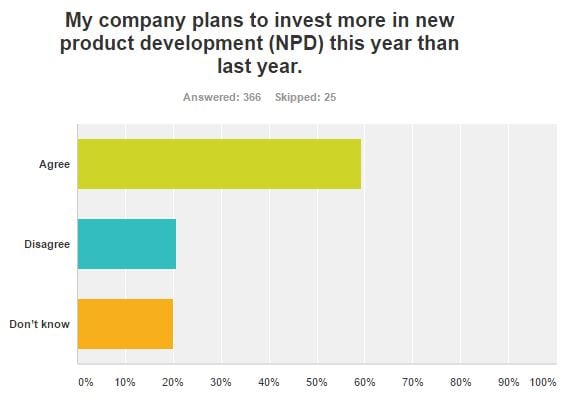
Almost 400 readers took part in our survey, and of those around 60% said their company plans to invest more in new product development (NPD) this year than last year, with several respondents saying it was a way to "stay ahead".
“NPD and innovation are the only way forward in the present uncertain climate,” said one.
New recruits or more automation?
On taking on more staff, 38% said they would be recruiting more personnel this year compared to last while a similar number (40%) said this would not be the case.
“We will be seeking to benefit from automation,” responded one individual, reiterating other comments about the need to downsize.
One Belgian respondent said it is becoming increasingly hard to find skilled workers while another reader in the meat industry said it is difficult to find suitably qualified individuals to fill high-level positions. “The food industry is not glamorous and hard work to the young,” lamented another.
Social media marketing: The top brass just don't get it
Traditional marketing channels to promote a company or product are diminishing in importance, with 61% saying online marketing and social media would be more important in 2017.
The reason is simple for one reader: “We can reach more people more cost effectively.”
But some feel that, while these channels hold plenty of promise, the top brass just still don't get it. “It should be [more important] but higher management is not convinced of the added value.”
But of course, its use depends enormously on internet access in the region in question, with one reader commenting that traditional marketing is still very important in Nigeria.
Sustainability and social missions: 'Uninformed hysteria?'
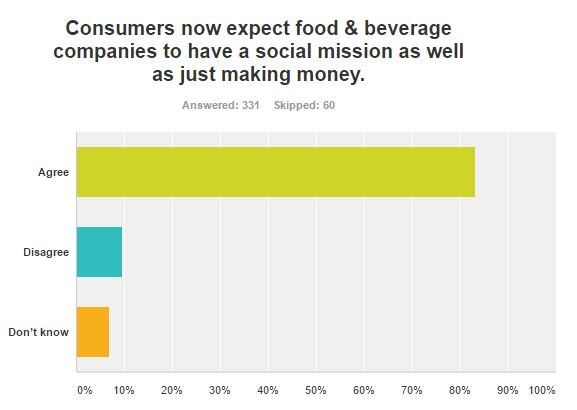
The vast majority (83%) agreed that consumers now expect food and beverage companies to have a social mission as well as just making money although not everyone was convinced that fully-informed consumers are what's fuelling the trend.
"I am not sure that consumers are the real driver. I suspect marketing often leads to 'The Emperor's New Clothes'," wrote one reader. "NGOs and uninformed blog hysteria have a negative influence," added another.
Nor are consumers always willing to put their money where their mouths are. "We have suppliers with good social responsibility - our customers are interested, but this doesn't influence the decision to buy."
Sugar: 'Less sugar means more chemicals'
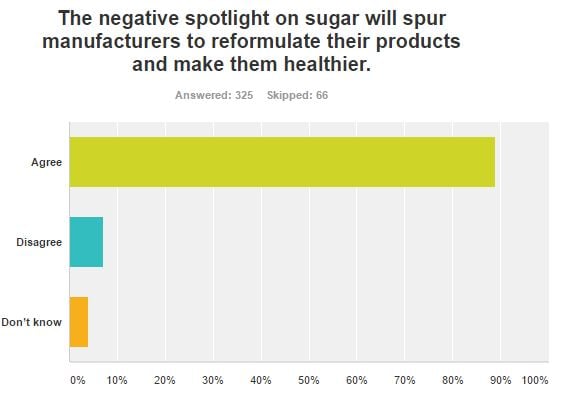
A massive 89% said the negative spotlight on sugar will spur manufacturers to reformulate their products and make them healthier but there were some strong opinions on whether this would be effective. “Very few companies will do anything except reword their ingredients list,” said one six readers commented that, yes, companies will reduce sugar in their products but that this will not necessarily make those products healthier.
“[They will] probably [reformulate] but they will be replaced with chemicals that will be marketed as unhealthy in the coming years. Overall, we are downgrading our food offering in terms of organoleptic delivery.”
Most readers (71%) also believe more European countries will consider taxing sugar-sweetened beverages to improve public health this year, although several readers said this will be to generate tax revenue with public health an “excuse” for doing so.
Origin labelling: 'It's emotional manipulation'
Our readers were divided over the impact of the trend towards mandatory country of origin labelling. A slight majority (38%) said it was worrying for suppliers and manufacturers operating in the European Union’s single market – “Consumers have no idea about the impact of this measure. Its emotional manipulation,” said one – while 31% disagreed with this and 31% said they didn’t know.
Cleaning up a product’s label will be 2017’s top priority for just over half (52%) of respondents, with many readers saying their ingredients are already clean.
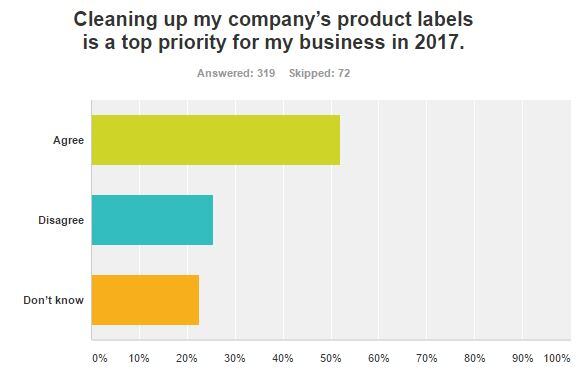
Will readers be investing more in organic ingredients and products this year? “Not until it's clear the consumer WILL accept the higher retail cost of new clean/organic products,” said one.
Say what?
Here’s a selection of your comments…
On palm oil
“We are not going to save the planet by removing palm oil from our products, if people eat another oil, palm will be replace by sunflower or corn. The forest will still be destroyed.”
“It’s important for all to establish credible sustainability standards and practices.”
On sugar, taxes and healthy reformulation
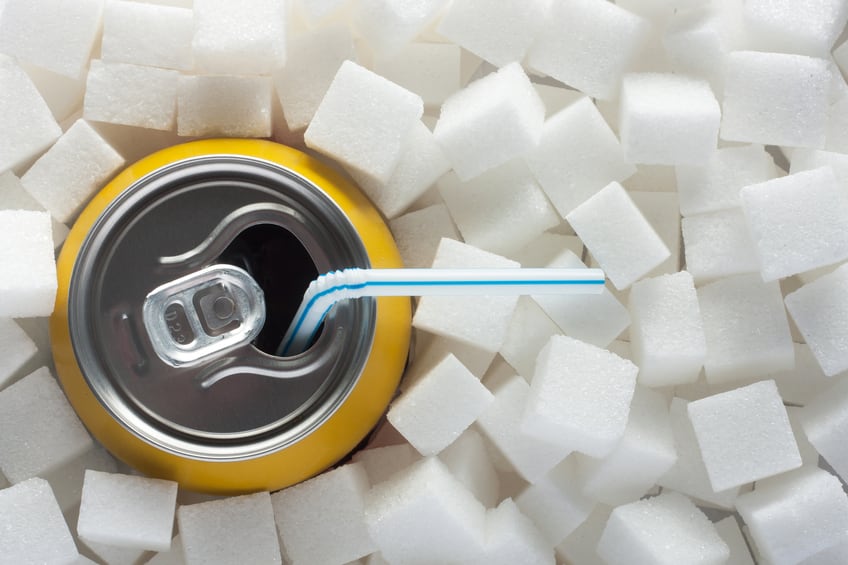
“[Sugar reduction] will be at the expense of the consumer. The flavour and appearance will erode and the price will sharply increase. John Q. Public loses every time.”
“Consumer education is more important than reformulating with sugar alternatives.”
“Implementing marketing programmes for fresh fruits and vegetables that are equivalent to processed food marketing would be much more effective in motivating consumers to make better choices. If it works for processed foods why wouldn't it work for fresh foods?”
On antibiotics in farming
"’Raised without antibiotics’ labelled products will grow, independently controlled by food certification bodies like Bureau Veritas.”

On investing in organic
“There is not one organic certification system in place for all countries. This would not make sense.”
“Organic ingredients are another market scam which lead to deadly food poisoning outbreaks, diminished quality of consumables and higher costs to consumers.”
On Brexit
“I think it will be positive, if used correctly, to promote British products.”
“[The impact] will become clearer when a decision is finally reached.”
On the rise of plant proteins

“This is a re-cycled marketing ploy which will lead to a temporary increase in consumer demand.”
“I don't really care to be honest, but we have to eat less meat whatever.”
What are the biggest challenges your business faces today?
“’Cleaning’ ingredient labels while maintaining expected taste and functionality.”
“The mergers of companies that are leading to huge groups [which] reduces the potential number of customers.”
“Being nimble enough to anticipate the next trend, without being bogged down in processes.”
"Reducing sugar."

“Consumer approval on the reformulation of products (sugar reduction & addition of functional ingredients).”
“Dealing with the latest fear mongering of food and food ingredients and the demonisation of established science and food safety practices.”
“Complying with ever increasing food safety demands.”
“To promote ingredients that have excellent clinical study result but no EFSA claim approved.”
